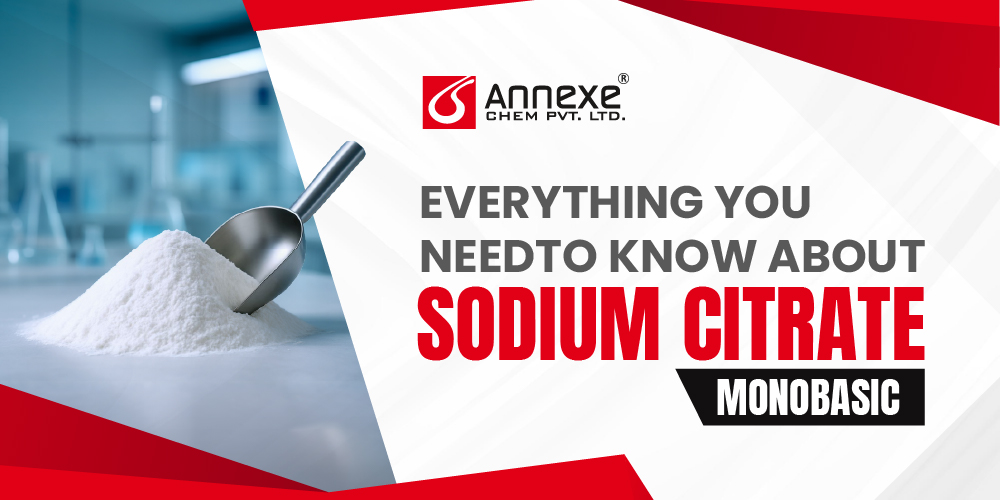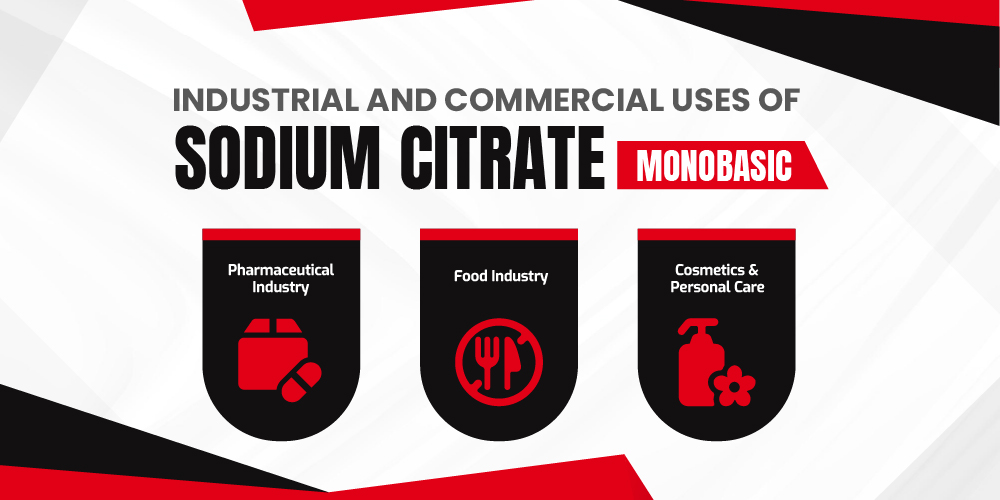Sodium Citrate Mono Basic: Uses, Benefits & Safety
Everything You Need to Know About Sodium Citrate Mono Basic

- April 22, 2025
- By Akshita Patel
When you think of essential ingredients in food, medicine, or even cosmetics, Sodium Citrate Mono Basic probably isn’t the first thing that comes to mind. But this seemingly simple compound plays a crucial role in maintaining pH balance, enhancing stability, and even improving shelf life in countless products we use daily.
From keeping your favorite beverages fresh to ensuring pharmaceutical formulations work effectively, this sodium salt of citric acid is an indispensable component across industries. But what exactly is Sodium Citrate Mono Basic, and why does it matter? Let’s explore its properties, uses, and why it deserves more recognition than it gets.
Chemical Properties & Composition of Sodium Citrate Mono Basic
Molecular Formula and Structure
Sodium Citrate Mono Basic, a sodium salt of citric acid, has the molecular formula C₆H₇NaO₇. It consists of a citrate anion bonded with a single sodium ion, making it distinct from other citrate salts like trisodium or disodium citrate. This unique structure gives it specific buffering and chelating properties, making it ideal for various industrial applications.
Physical Appearance
- Color & Form: Typically appears as a white, crystalline powder or granular solid.
- Solubility: Highly soluble in water, forming a clear solution, but insoluble in organic solvents like alcohol.
- pH Levels: Being mono-basic, it has a more acidic pH compared to trisodium or disodium citrate, making it suitable for applications requiring lower pH control.
How Does It Differ from Other Citrate Salts?
- Mono Basic Sodium Citrate (C₆H₇NaO₇): Contains only one sodium ion, making it more acidic and ideal for formulations needing precise pH regulation.
- Di Sodium Citrate (C₆H₆Na₂O₇): Has two sodium ions, offering a slightly higher pH, and is often used in food and medical applications.
- Tri Sodium Citrate (C₆H₅Na₃O₇): The most alkaline of the three, with three sodium ions, commonly used as a buffer, emulsifier, and anticoagulant.
The key difference lies in their pH levels and buffering capacities, which dictate their suitability for different applications. Sodium Citrate Mono Basic, with its lower pH, is particularly useful in pharmaceuticals, cosmetics, and specialized chemical formulations.
Benefits of Sodium Citrate Mono Basic
Sodium Citrate Mono Basic is more than just a common ingredient—it plays a crucial role in ensuring product stability and safety across industries. Here’s why it’s widely used:
- Maintains pH Balance – Acts as a buffering agent, keeping formulations stable by regulating acidity and alkalinity.
- Enhances Shelf-Life – Prevents spoilage in food and pharmaceutical products by inhibiting microbial growth and oxidation.
- Safe and Non-Toxic – Recognized as a GRAS (Generally Recognized as Safe) ingredient, making it suitable for consumption and cosmetic applications.
- Acts as a Stabilizer in Emulsions – Helps blend oil and water-based ingredients in food, cosmetics, and industrial formulations, ensuring a smooth, consistent texture.
With these benefits, Sodium Citrate Mono Basic proves to be an essential ingredient in maintaining product quality and performance.

Industrial and Commercial Uses of Sodium Citrate Mono Basic
Sodium Citrate Mono Basic is a versatile compound used across multiple industries, thanks to its buffering, stabilizing, and emulsifying properties. From pharmaceuticals to food processing and even cosmetics, this ingredient plays a crucial role in enhancing product stability and effectiveness. Let’s explore its key applications across various sectors.
- Pharmaceutical Industry – Role as a Buffering Agent in Medications: In the pharmaceutical world, maintaining the right pH balance is critical for drug stability and efficacy. Sodium Citrate Mono Basic acts as a buffering agent, helping to regulate the acidity or alkalinity of liquid and solid drug formulations.
- Ensures drug stability – Prevents unwanted chemical reactions caused by fluctuations in pH.
- Enhances solubility – Helps dissolve active pharmaceutical ingredients more effectively.
- Used in oral and injectable medications – Found in syrups, effervescent tablets, and IV solutions.
- Aids in anticoagulant solutions – Used in blood storage bags to prevent clotting.
Its ability to maintain an optimal pH makes it a crucial component in various medicinal formulations, ensuring better absorption and effectiveness.
- Food Industry – Use as an Acidity Regulator and Preservative: Sodium Citrate Mono Basic is widely used in the food and beverage industry as a food additive (E331) to regulate acidity, enhance flavor, and improve shelf life.
- Acidity regulator – Helps balance pH in foods like jams, dairy products, and carbonated drinks.
- Preservative – Inhibits microbial growth, extending the shelf life of processed foods.
- Emulsifier and stabilizer – Prevents separation in dairy-based products like cheese and cream-based sauces.
- Flavor enhancer – Improves taste by moderating sourness in soft drinks and candies.
Due to its non-toxic nature and GRAS (Generally Recognized as Safe) status, it is a widely accepted additive in both processed and fresh food applications.
- Cosmetics & Personal Care – Application in Skincare and Hygiene Products: In the cosmetics and personal care industry, Sodium Citrate Mono Basic serves as a pH adjuster and chelating agent, improving the performance and stability of various products.
- pH balancer in skincare – Ensures that creams, lotions, and serums remain gentle on the skin.
- Enhances preservation – Prevents the degradation of active ingredients in beauty products.
- Used in oral care – Found in toothpaste and mouthwash to help maintain a neutral pH.
- Boosts cleansing efficiency – Helps soaps and shampoos lather better and remove impurities effectively.
Its ability to stabilize formulations and enhance product effectiveness makes it a valuable ingredient in beauty and hygiene products.
- Laboratory & Chemical Processing – Role in Research and Formulation: Sodium Citrate Mono Basic is a crucial reagent in scientific research and industrial chemical processing due to its ability to control pH and act as a chelating agent.
- Biochemical research – Used in buffer solutions for molecular biology experiments.
- Water treatment – Helps in the removal of heavy metals by binding with metal ions.
- Chemical synthesis – Plays a role in various industrial reactions that require controlled acidity.
- Electroplating and metal processing – Used in surface treatments to prevent oxidation.
Its chemical versatility makes it indispensable in laboratory settings and industrial-scale manufacturing processes.
Sodium Citrate Mono Basic may not be widely recognized, but its impact spans multiple industries, ensuring product stability, safety, and effectiveness. Whether in medicines, food, cosmetics, or industrial applications, this compound continues to play an essential role in modern formulations.
Potential Side Effects & Safety Considerations
Sodium Citrate Mono Basic is widely regarded as safe for use in food, pharmaceuticals, and personal care products. However, like any chemical compound, excessive consumption or improper handling can lead to certain risks. Here’s what you need to know about its safety and regulatory considerations.
- Possible Health Concerns with High Consumption: While Sodium Citrate Mono Basic is generally non-toxic and safe, excessive intake can cause:
- Gastrointestinal discomfort – High doses may lead to nausea, bloating, or diarrhea.
- Electrolyte imbalance – Overconsumption can alter sodium levels in the body, potentially affecting kidney function.
- Metabolic alkalosis – Extremely high intake may disrupt the body’s acid-base balance, though this is rare.
To minimize risks, it should be used in moderation and within recommended limits in food and medical applications.
- Safe Handling and Storage Guidelines: Proper handling and storage ensure the stability and effectiveness of Sodium Citrate Mono Basic:
- Storage conditions – Keep in a cool, dry place away from moisture and direct sunlight.
- Handling precautions – Use protective gloves and eyewear in industrial settings to avoid irritation.
- Avoid contamination – Store in airtight containers to maintain purity and prevent degradation.
Following these guidelines ensures both product safety and user protection in industrial and commercial use.
- Regulatory Approvals (FDA, EFSA, etc.): Sodium Citrate Mono Basic is approved by major health and safety authorities:
- FDA (U.S. Food and Drug Administration) – Classified as GRAS (Generally Recognized as Safe) for food and pharmaceutical use.
- EFSA (European Food Safety Authority) – Approved as a food additive (E331), regulating its permissible levels in food products.
- Codex Alimentarius – Recognized as a safe acidity regulator and stabilizer in global food standards.
These approvals affirm its safety and reliability, making it a trusted ingredient across industries.
By following proper usage guidelines and safety measures, Sodium Citrate Mono Basic remains an essential and safe component in food, medicine, and industrial applications.
Future Applications & Innovations of Sodium Citrate Mono Basic
As industries evolve, Sodium Citrate Mono Basic is finding new and innovative applications, particularly in biotechnology, pharmaceuticals, and sustainability efforts.
- Emerging Uses in Biotechnology & Pharmaceuticals – Researchers are exploring its role in drug delivery systems, advanced biopharmaceutical formulations, and tissue engineering. Its ability to maintain pH stability makes it valuable in next-gen medical treatments.
- Sustainable Production & Eco-Friendly Applications – With the growing focus on green chemistry, manufacturers are working on eco-friendly synthesis methods to reduce waste and energy consumption. Additionally, its biodegradable nature makes it a safer alternative in environmentally conscious formulations.
With ongoing research and technological advancements, Sodium Citrate Mono Basic is set to play an even greater role in the future of medicine, food, and sustainable industries. Sodium Citrate Mono Basic may not be a household name, but its impact spans multiple industries—from pharmaceuticals and food preservation to cosmetics and biotechnology. Its ability to regulate pH, enhance stability, and act as a safe, non-toxic additive makes it an essential ingredient in modern formulations.
When it comes to sourcing high-quality Sodium Citrate Mono Basic, Annexe Chem Pvt. Ltd. stands out as the best choice. With state-of-the-art manufacturing facilities, stringent quality control, and a commitment to sustainable production, we ensure you get a pure, reliable, and industry-compliant product. Whether you need it for pharmaceutical, food, or industrial applications, Annexe Chem delivers superior solutions tailored to your needs.
Partner with Annexe Chem Pvt. Ltd. today and experience excellence in chemical manufacturing!

Akshita Patel
As an advocate for sustainability, Akshita is committed to driving positive change within the chemical industry. She actively seeks out environmentally friendly solutions and promotes the adoption of sustainable practices. Akshita believes that a balance between economic growth and ecological responsibility is crucial for the industry's long-term success. She is dedicated to finding innovative ways to minimize environmental impact while maximizing efficiency and profitability.
Related Blogs

- March 4, 2025
- By Akshita Patel
Everything You Need to Know About.
Did you know that a tiny yet powerful compound is crucial in medicine and skincare? Meet.

- August 6, 2024
- By Akshita Patel
Everything You Need to Know About.
In the vast world of industrial and scientific materials, Calcium Sulphate Anhydrous often flies under the.



